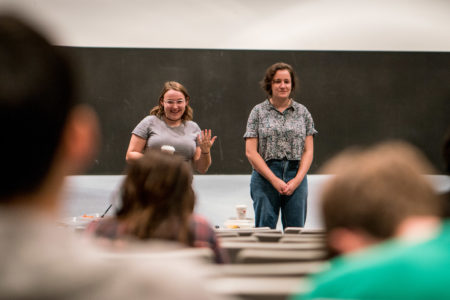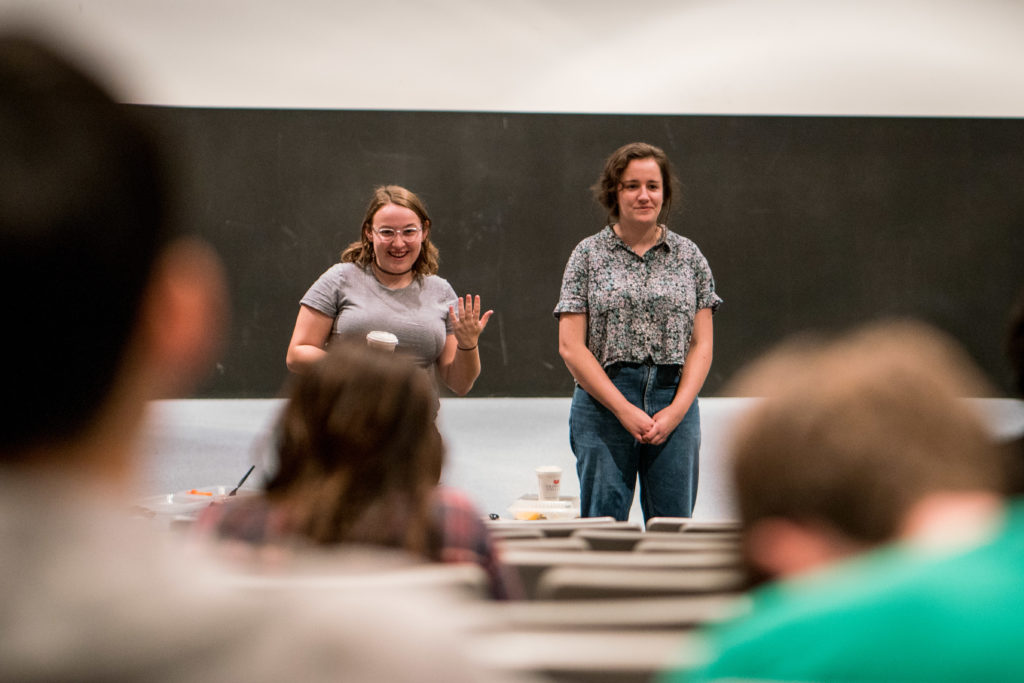
By Mira Braneck
braneckm@grinnell.edu
Throughout the fall 2016 semester, student group Dissenting Voices has been working to combat sexual assault and the culture that surrounds it on campus. This work cannot be done alone, which is why Professor Theresa Geller, English, has been collaborating with Dissenting Voices to provide faculty support to their cause.
“A couple years ago, when Dissenting Voices went around and asked a bunch of faculty members if they wanted to join Faculty Against Rape (FAR), Professor Geller was the only person who joined,” said Leah Barr ’19, one member of the Dissenting Voices leadership.
According to the group’s website, “FAR is a volunteer-run collective dedicated to getting more faculty involved in confronting campus sexual assault … FAR is committed to supporting faculty members who experience retaliation because of their efforts to address sexual violence on campus.”
Dissenting Voices is not associated with the College, and members describe themselves as a group of policy-driven activists who aim to fight rape culture on campus and make structural change at the College.
Faculty participation in the discourse surrounding rape culture and sexual assault on campus can often be a controversial subject. Members of the faculty are sometimes reluctant to speak out against their institution in fear of the retaliation from college administrations.
“My assumption is that people are afraid about being punished for speaking out … even tenured professors. I don’t think that there are any faculty members who on this campus who are pro-rape, but I think that they have to sort of do something to mediate keeping their job,” Barr said. “And I think that brings up interesting questions of what are professors’ roles as advisors because all professors are mandatory reporters.”
In addition to asking professors to join Faculty Against Rape again, Dissenting Voices has other plans for the semester: eliminating what they see as conflicts of interest in the Title IX office and creating or reinforcing institutional memory at the College.
According to Dissenting Voices, current Title IX coordinator Angela Voos is unable to adequately perform the role of Title IX coordinator because she is housed in the President’s office and has two additional roles at the College.
“The Title IX coordinator, we believe, should be a separate entity from the President’s office. The rationale that we’re given is because the Title IX office is housed within the President’s office, within the physical space and conceptually, it’s showing students the importance of that office. But to be an important and autonomous office, you can report directly to the President without being in the President’s office,” Barr said. “We also need a Title IX coordinator who is full time. It’s not fair to demand of Angela Voos that she has three full-time jobs. She is a human being. There are 24 hours in a day. That’s not a reasonable thing to ask of anyone.”
Barr noted that the College of Wooster in Ohio, which was recently placed under investigation by the Office of Civil Rights, is similar to Grinnell and employs a Title IX coordinator who holds several titles.
“Their complaint was also that their Title IX coordinator had a conflict of interest and their Title IX coordinator had two of the exact same positions that our Title IX coordinator has. So immediately within like a week and a half, they started a national search for a new Title IX coordinator,” Barr said. “So I’m thinking if we can find peer institutions that are doing what I believe we should be doing, that we can create a more convincing argument.”
In addition to pushing the College to hire a full-time Title IX coordinator, Dissenting Voices is working on campus to develop greater institutional memory surrounding sexual assault.
“Essentially every four years there’s an entirely new cohort of students and everyone who has been here is gone, and that makes it really easy for schools to just sort of pedal back on progress, or students aren’t pushing as hard because they haven’t seen the things that haven’t gone right,” Barr said. “So something that we feel is really important is to keep the momentum going and make sure that people are still angry, because there’s a lot to be angry about. And there’s hope that if we get angry enough and we work on policy, we can change something. And we’ve shown that.”
One way that Dissenting Voices tries to reinforce institutional memory is by publicizing Grinnell’s history of sexual assault. However, these efforts are often met with pushback. Barr feels as though the College is not fulfilling its duty to inform students. She sat in on the community values sessions on sexual respect during New Student Orientation, and was shocked that Grinnell’s federal investigation was not brought up.
“They literally did not mention that Grinnell is under investigation by the federal government for violating a civil rights statute,” she said. “And I think that’s something that every student here has the right to know.”
Dissenting Voices would also like to see stricter punitive policies surrounding sexual assault on campus.
“For the most part, rapists on this campus are not expelled. They sometimes receive sanctions, no contact orders. … [which] don’t do anything,” Barr said. “Rapists know they can rape with impunity. They know that they’re not really going to be punished. So it doesn’t deter them. So if we create these policies with more stringent punishments or sanctions, I think the incidents of rape would go down. But the general consensus on campus is you can rape multiple people and not much is going to happen to you.”
Barr, along with Dissenting Voices, wants to stress that sexual assault does happen at Grinnell, and that it is an issue that we as a campus must combat.
“I think that there was this idea, especially this year … is that this isn’t really a Grinnell problem, that we live in this insular, liberal, and in some cases radical community of intelligent people,” she said. “Our reporting statistics are low, like everywhere else. But the incidents is just as high as it is anywhere else.”

























































